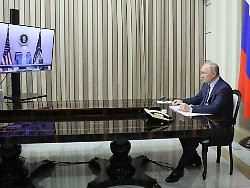Tuesday, December 7th, 2021
Russian troop deployment
Biden and Putin start crisis summit
Just six months after their summit in Geneva, Russian President Putin and US President Biden are again seeking direct dialogue. Biden wants to talk to the Kremlin chief about how a military escalation in the Ukraine conflict can be prevented.
Shadowed by massive tensions in the Ukraine conflict, Russian President Vladimir Putin and his US colleague Joe Biden exchanged views at a video summit. Russian state television showed the Kremlin chief at his desk in front of a screen. “Good to see you again,” said Biden in greeting. Unfortunately, the Kremlin chief was not at the G20 summit in Rome at the end of October. Next time he wants to meet Putin personally again, said the US President.
Moscow had prepared for a long evening even before the talks began. Kremlin spokesman Dmitri Peskov emphasized that no “breakthroughs” were to be expected from the summit. It is “a work meeting at a very difficult time”. A few hours before the switch, which was therefore led via a specially protected and tap-proof line, warnings had come from Moscow again with a view to Ukraine.
NATO is alarmed by reports of alleged Russian plans to attack Ukraine. Moscow, on the other hand, rejects the accusation of aggression and in return accuses Ukraine of having deployed more than 120,000 soldiers on the line to the eastern Ukrainian separatist regions of Donetsk and Luhansk. The topic is likely to dominate the conversation between Putin and Biden, who first met personally as heads of state in Geneva in June.
Biden consulted with European allies before the summit
“Russia has no plans to attack anyone, but we have our fears and our ‘red lines’,” Peskov said before the video summit. Last week, Putin said that the relocation of NATO military infrastructure to Ukraine could represent such a “red line” from a Russian point of view. The Kremlin chief spoke out in favor of a written end to NATO’s eastward expansion. Biden, in turn, consulted with European allies before the summit, including the outgoing Chancellor Angela Merkel.
US Secretary of State Antony Blinken phoned Ukrainian President Volodymyr Zelensky on Monday. According to the White House, several heads of state and government expressed common concern about “Russian military build-up on the border with Ukraine and Russia’s increasingly harsh rhetoric”.
EU Commission President Ursula von der Leyen threatened Moscow with further sanctions. The European Union will rule on further aggression from Moscow, said von der Leyen. Existing sanction regimes could be expanded or new punitive measures could be taken. She wanted to underline “the unreserved and unshakable support of the EU for Ukraine”. Currently, it is Russia’s conscious choices and aggressive actions that are further destabilizing Europe’s security.
